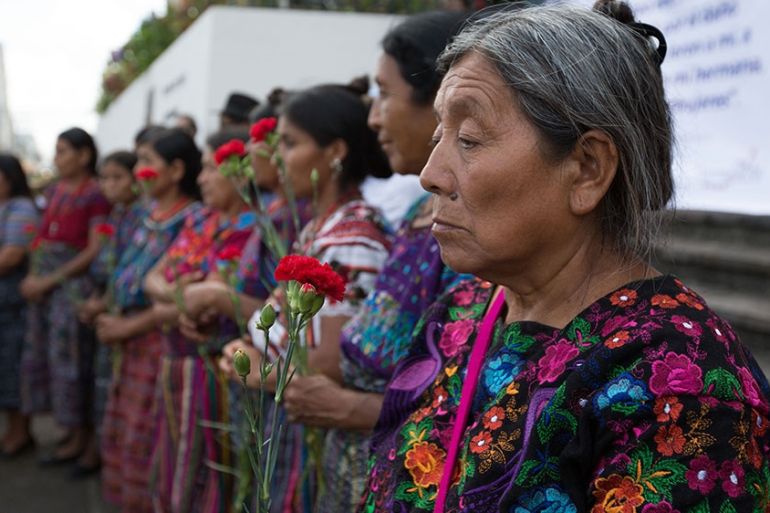Guatemala survivors of wartime sexual violence fight for justice
Lawyers vow to appeal after judge rules against Maya Achi women who said they were raped during Guatemala’s civil war.

Guatemala City, Guatemala – Indigenous Maya Achi women who said they were raped by paramilitary group members during Guatemala‘s 36-year-long civil war have suffered a major setback in their nearly decade-long quest for justice.
After the prosecution’s testimonies, witness statements, documentation and reports, a judge ruled on Friday there was insufficient evidence to send six former PAC paramilitary patrol members to trial for crimes against humanity for wartime sexual violence against 36 Maya Achi women.
Keep reading
list of 4 itemsNigeria’s women drivers rally together to navigate male-dominated industry
Members of London’s Garrick Club vote to let women join for first time
Why has Australia declared a ‘national crisis’ over violence against women?
Three of the six were acquitted. The other three will also be released, but judge Claudette Dominguez gave prosecutors a month to present further evidence and will hold a hearing on August 5 to determine whether they will be acquitted or the case will proceed to trial.
“I can’t speak,” Paulina Ixpata, one of the survivors, told Al Jazeera after the ruling.
Ixpata and the other survivors left the court building and sought shelter from the pouring rain under an overhang, where they discussed the ruling in Achi, her first language. Many of the women speak little or no Spanish, and no interpretation had been provided by the court.
One of the women’s lawyers explained the outcome, as a mixture of grief, frustration and resignation settled in. Earlier in the day, they had expressed cautious optimism about the outcome of the hearing.
“What we want is justice,” Ixpata told Al Jazeera following a ceremony on Friday morning outside the Guatemala City tribunal complex.

During the 1960-1996 civil war between the army and leftist guerrilla forces, an estimated 200,000 people were killed. Most were indigenous Maya civilians and the army was responsible for more than 90 percent of atrocities, according to a UN-backed truth commission.
The state carried out acts of genocide in four regions, including the Maya Achi region, the truth commission concluded. Indigenous women around the country have been increasingly pushing for justice for the use of rape as a weapon of war in the context of genocide.
“We experienced it first-hand,” said Ixpata.
In 2010, Ixpata and other Maya Achi women from villages in the Rabinal municipality, 100km north of Guatemala City, began organising together and reached out to the Asociacion Bufete Juridico Popular, an indigenous-led human rights law firm in Rabinal. Together they presented the case the following year to the local public prosecutor’s office, but it was stalled.
“When it comes to crimes during the armed conflict, prosecutors are often scared and do not want them to move forward,” Gloria Elvira Reyes, one of the lawyers representing the women, told Al Jazeera.
‘This case is not over’
In the early 1980s, PAC members in the area operating under military command raped Maya Achi women and girls, according to survivors and prosecutors, who also said many were held for weeks and assaulted by multiple perpetrators within military facilities. Some were young girls under the age of 13.
Reyes and her colleagues eventually got the case transferred to the Office of the Special Prosecutor for Human Rights in Guatemala City. In 2015, prosecutors began gathering sworn testimonies and gradually advanced in their investigation.
In 2018, a judge issued 10 arrest warrants for 10 ex-PAC members. Six were apprehended in May 2018, a seventh was apprehended in August, but one died later that month. Another was arrested two months ago in the United States, and the other two remain fugitives.
“They killed our family members too,” Ixpata said of the army and the PAC. “Many were massacred and disappeared.”
In 1982, 12 of Ixpata’s close relatives were killed in a massacre in a nearby municipality. The victims included three of her siblings, and six young nieces and nephews, including a nine-month-old baby. Ixpata was 18 years old at the time.
The year before, in 1981, Ixpata’s brother Tereso was detained and disappeared by security forces on his way from the village to work in nearby farmland.
“We have done so much searching and given DNA samples,” said Ixpata. “But he has never been found.”
The hearing on Friday coincided with Guatemala’s National Day of Forced Disappearance. An estimated 45,000 men, women and children were disappeared during the conflict. Investigations and exhumations continue.
The Maya Achi women’s search for justice will also continue. Plans are already in the works to appeal the judge’s rulings, Reyes told Al Jazeera outside the court.
“I am frustrated and I am angry. But getting angry doesn’t really get us anywhere,” Reyes said.
“I told the women not to be too sad. This case is not over,” she added.